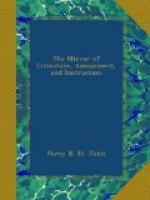[1] The above columns, with
those of the handsome Ionic calonnade
which
screened the Palace from Pall Mall, are, we believe,
the
only
remains of the building.
[2] The entrance deserves this epithet on more than one account.
* * * * *
MANNERS AND CUSTOMS.
* * * * *
ANCIENT AND MODERN CHRISTMAS.
“Anciently there was in the king’s house,” says Stow, “wheresoever he lodged, at the feast of Christmas, a ’Lord of Misrule, or Master of Merry Disports;’ and the like also was there in the house of every nobleman of honour or good worship, whether spiritual or temporal. Among these, the Mayor and Sheriffs of London had their several Lords of Misrule, ever contending, without quarrel or offence, who should make the rarest pastime to divert the beholders. These Lords began their rule, or rather misrule, on All Hallow’s-eve, and continued the same until Candlemas-day, in which space there were fine and subtle disguisings, masques, and mummeries, with playing at cards for counters, nails, and points, in every house, more for pastime than for gain. Against this feast, the parish churches and every man’s house were decked with holm, ivy, bay, and whatsoever the season of the year afforded that was green; and the conduits and standards in the streets were likewise garnished.”
W.G.C.
Kent.
At Ramsgate they commence their Christmas festivities by the following ceremony:—A party of the youthful portion of the community having procured the head of a horse, it is affixed to a pole, about four feet in length; a string is attached to the lower jaw, a horse-cloth is tied round the extreme part of the head, beneath which one of the party is concealed, who, by repeated pulling and loosening the string, causes the jaw to rise and fall, and thus produces, by bringing the teeth in contact, a snapping noise, as he moves along; the rest of the party following in procession, grotesquely habited, and ringing hand-bells! In this order they proceed from house to house, singing carols and ringing their bells, and are generally remunerated for the amusement they occasion by a largess of money, or beer and cake. This ceremony is called “a hoodening.” The figure which we have described is designated “a hooden,” or wooden horse. The ceremony prevails in many parts of the Isle of Thanet, and may probably be traced as the relic of some religious ceremony practised in the early ages by our Saxon ancestors.
Norfolk.




